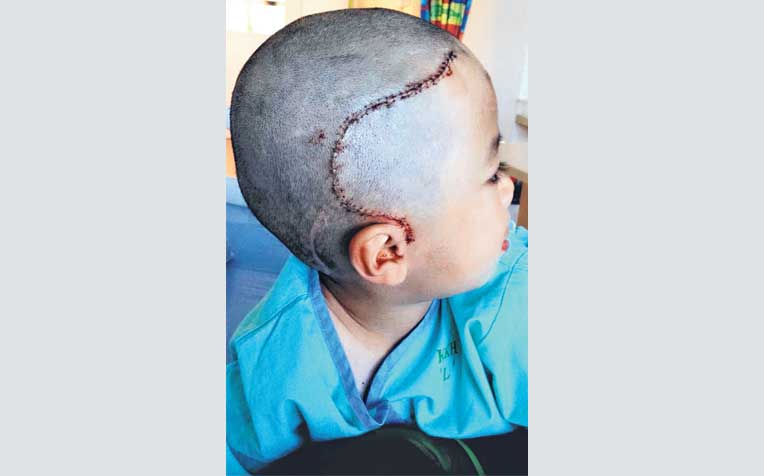
on Javier Lim’s skull are proof of the painful operations he has had over the past three years.
Up until the age of six, Javier Lim was a healthy preschooler whose idea of a fun day was an afternoon jaunt at the playground.
But all that changed when doctors found tumours in his brain, each about the size of a marble, three years ago.
Now nine, he has spent a third of his childhood battling multiple brain tumours. His skull has been cut open and stitched up about 10 times to remove the tumours or to fix post-surgery complications.
The Primary 3 pupil has a drainage tube, called a shunt, implanted permanently inside his body to relieve pressure onhis brain.
Part of the device is visible under the skin on his back. This means he can no longer engage in physical activities – just going down a slide in the playground might be enough to damage the device.
According to Assistant Professor David Low, vice-president of the Brain Tumour Society Singapore, about 40 to 50 operations are carried out on children with brain tumours in restructured hospitals every year.
There are no statistics of the number of children in Singapore with brain tumours, which can be difficult to track as there are more than 120 types, says Prof Low, the head of neurosurgical service at KK Women’s and Children’s Hospital and consultant neurosurgeon at National Neuroscience Institute.
Javier’s parents found out about his brain tumour by chance, when they took him to see an eye doctor in 2013. His teachers had noticed that he would tilt his head to one side while doing school work.
His mother, Mrs Sharon Lim, 35, an assistant teacher, said: “Initially, we thought he had a ‘lazy eye’, but the doctors noticed that something wasn’t quite right. When the scans revealed not one, but two tumours in his brain, we were devastated.”
The diagnosis was the beginning of a “nightmare” for the Lims, who also have a daughter aged four.
Javier’s first major brain operation was hard on everyone, Mrs Lim added. Waiting out the eight-hour surgery was nerve-racking enough for his parents, but the aftermath was even worse when he woke up screaming his lungs out.
Although he was only six then, Javier vividly remembers the intense pain. “I was screaming like crazy because my head hurt so much. Having IV drips poking into my skin hurt a lot too,” he said.
His father, Ken, 39, a warehouse assistant, said: “That night, the doctors increased the dosage of the painkillers so that he could sleep.”
After surgery, Javier struggled to regain his ability to walk, and control his movements and speech.
It took him about six weeks to get back to normal.
But life, as the Lims found out, would never be “normal” again. For every tumour the doctors removed, a new one would appear in the same area every subsequent year.
The worst is still not over. In September this year, scans revealed another new growth in Javier’s brain– his fifth tumour.
“We couldn’t believe it when the doctor told us another tumour had popped up in his brain,” Mrs Lim said. “I just sat there and cried my eyes out. What else could I do?”
Javier will undergo surgery again this month to remove the growth in his brain. No one can explain why he gets these tumours – which are said to be more common in older adults – at such a young age, said Mrs Lim.
His tumours are considered to be benign (non-cancerous). But any tumour in the brain, whether it is cancerous or not, can be dangerous and life-threatening, said Prof Low, who is treating Javier.
It is also possible for a benign tumour to recur, although the risk is much lower,compared to an aggressive cancerous tumour, he added.
Treatment such as surgery also comes with certain risks.
Although Javier manages to bounce back after each operation, being away from school for long periods of time has affected his studies.
While on treatment, he skipped most of Primary 1 and about a third of Primary 2. There is a high chance that he will be retained in Primary 3 next year as he is unable to cope with his school work.
His long-drawn illness has also taken a toll on the family. Mrs Lim said she felt guilty about neglecting her daughter. “I know she sometimes feels jealous because we are always focusing on Javier. I feel really bad about it.”
Mr Lim is worried about his job. “So far, I’ve taken about three months of unpaid leave to look after Javier after his operations.”
Still, the Lims count their blessings that most of Javier’s medical expenses, which added up to about $100,000, were covered by insurance.
They are grateful for the help from kind-hearted people, including members of the Brain Tumour Society Singapore support group.
Mrs Lim said her boss and colleagues have been supportive. They once organised a fundraising project to help her family get through a particularly difficult month.
The Lims are bracing themselves for Javier’s upcoming surgery.
“The new tumour has affected the nerves on the right side of his face and his sense of pain. Because of this, he has been over-rubbing his eyes and causing damage to his cornea,” Mrs Lim said. “The doctor said that if he continues like this, he might lose his eyesight.”
Having gone through so much in the past few years, Javier’s parents said they do not have any expectations and wish only for their son to be happy.
Mrs Lim said: “We don’t make any plans or ask that he score As in school.We only hope that, one day, hewill be tumour-free.”
Contributed by














 Get it on Google Play
Get it on Google Play